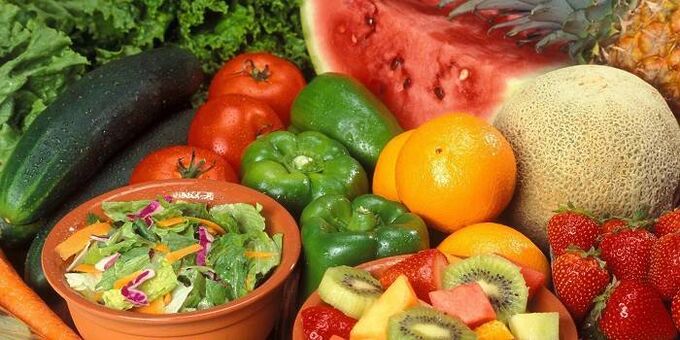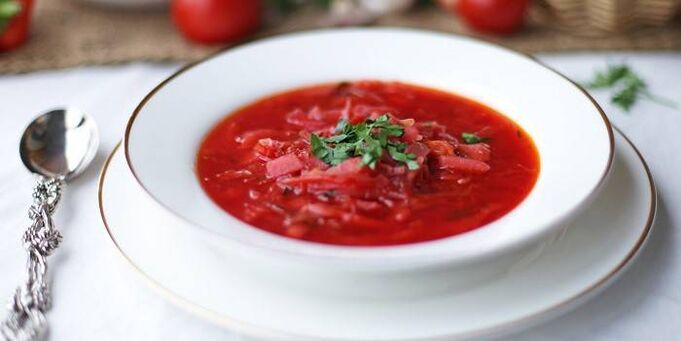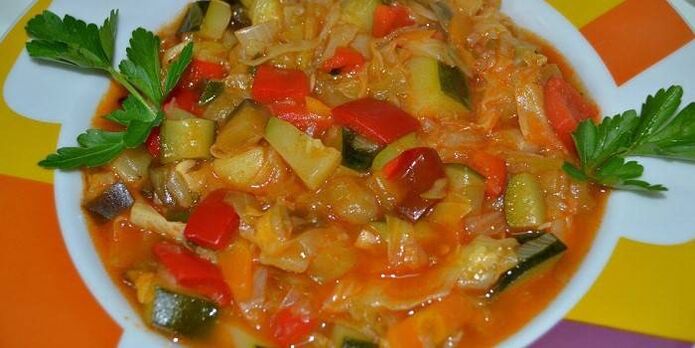The increased deposition of uric acid crystals in the tissues causes inflammation of the joints. The basis of the gout diet is the use of foods low in purines, substances that are the "culprits" of the disease. Treatment of the pathological process includes the rejection of bad habits, gradual weight loss, but the main condition for recovery is dietary nutrition.
What is gout
A joint disease that occurs when metabolism is disturbed is called gout. The risk of the disease increases in women during menopause and in men over 40 years of age. The disease begins with an increased production of uric acid, which the human kidneys cannot cope with. In the future, there is a buildup of urates (uric acid salts) in human joints.
How to eat with gout
Nutrition plays a key role in the treatment of gout. The disease affects people who abuse alcohol or eat a lot of food containing purines, substances in the body's cells. When these compounds are destroyed, uric acid is formed. Excess uric acid causes inflammation. Purines are found in protein foods, organ meats, yeast, seafood, and fatty fish, so it's recommended to exclude them.
General rules
The hypopurine diet is part of the therapy for the joint disease described. Against the background of the consumption of purines, uric acid is deposited in the joints. The patient is advised to exclude foods with the highest amount of excess salts. The doctor prescribes the treatment table number 6. The energy value of such a diet is 2700-2800 kcal per day. Diet therapy for gout includes:
- compliance with the regime of increased alcohol consumption;
- strict adherence to salt intake;
- A low-purine diet does not allow for more than 150 mg of purines per day.
Table of purine content in food
There are purines of plant and animal origin. Compounds in plant foods are safer for human consumption. Substances in meat and fish increase the risk of gout, and purine compounds in vegetables do not affect the risk of the disease. Milk purines have little effect on the disease. Content of substances in some foods:
| Products | Purine content (mg / 100 g) | Uric acid |
|---|---|---|
| Boiled sausage | 54 | 130 |
| Montone | 61 | 146 |
| Sprats | 223 | 535 |
| Cauliflower | 19 | 45 |
What can you eat with gout
It is necessary to reduce the amount of protein-rich foods to 1 g per 1 kg of human weight. If a patient with gout does not have chronic diseases of the kidneys or heart, it is necessary to drink more than 2. 5 liters of water and vegetable broths. Useful will be the use of alkaline mineral waters. It is allowed to use cooked food in boiled form and lean meat dishes (rabbit, chicken). List of foods useful for gout:
| Product | Benefit |
|---|---|
| Tomatoes | Contains minerals and vitamins |
| Potato | The product has a diuretic effect |
| Pumpkin | Reduces the risk of urate (uric acid) kidney stones. |
| Berries (cherries), nuts, seeds, grains (barley), dates, citrus fruits, zucchini, cucumbers | Useful substances remove salts |
What kind of fish can you eat
You can eat low-fat varieties of fish cooked in boiled form (160-170 g per day). It is forbidden to eat fried, salted fish and its derivatives: preserves, sprats, caviar, fatty varieties (herring, sardines, cod, pike). You can not eat fish broth (soup). You can eat squid, shrimp, marine cephalopods, crustaceans.
What not to eat
It is recommended to limit the intake of table salt (it is necessary to stick to the correct dose of 5-6 g). It is necessary to exclude meat dishes containing a high concentration of purines. A patient with gout should not overeat, but therapeutic fasting should not be carried out: divide the amount of food into 5-6 meals, follow the rules for using salt. After diagnosing gout, the doctor publishes a list of prohibited foods:
| Product group | Variety of food |
|---|---|
| Beverages | Alcohol, coffee, strong tea, cocoa |
| Vegetables | Mushrooms, sorrel, broccoli |
| Dairy products | Spicy and salty cheeses |
| Baked goods and sweets | Butter desserts, cakes, pies with cream (margarine) |
| cereals | Lentils, soy, oatmeal |
| Legumes | Beans, kidney beans, peanuts, peas |
| Berries and dried fruit | Grapes, raisins |
Diet for gout during an exacerbation
Based on the fact that gout is a disease of protein metabolism, characterized by an excess of the norm of uric acid salts in the body, the main essence of the diet is to reduce the level of saline substances. If an exacerbation occurs, a vegetarian diet is necessarily prescribed, which reduces gout attacks. Exacerbation occurs at night and is similar to acute arthritis. The treatment menu will help return to normal life, relieve the condition during acute attacks, relieve swelling and redness in the affected joint:
| Nutrition for gout during an exacerbation | Explanations |
|---|---|
| Peculiarities | Enrichment of the diet with the optimal amount of milk proteins and carbohydrates, ban on meat and fish broths. |
| Foods allowed and prohibited for gout | It is recommended to use compotes and juices, eat vegetarian vegetable soups, boiled meat and fish. Refuse spicy foods, offal (heart, kidney, liver), beans, salt, mushrooms, fatty and salty foods. |
| Recommendations | Split meals, eating at least 4 times:
|
Diet for gout feet
If you experience swelling and redness of the lower limbs, similar to attacks of arthritis, it is recommended to see a doctor. The therapeutic and nutritional diet for gout of the legs consists in refusing food with purines, limiting the intake of animal proteins. It is necessary to drink 2-3 liters of liquid, use alkaline drinks, vegetable soups, decoctions are useful. Do not eat spicy and salty foods with gout on the legs. Gout treatment provides an approximate menu:
- after waking up - a decoction of rose hips;
- for breakfast - buckwheat;
- second breakfast - tea with milk;
- lunch - potatoes with carrots and vegetable soup;
- afternoon snack - compote, green apple;
- dinner - vegetable salad, baked pancakes.
Diet for gout with obesity
A complication in the form of excess weight can significantly worsen the patient's condition and increase pain attacks. It is impossible to starve with gout, but how to normalize the state of the body? The answer to this question will be a properly composed patient diet. Nutritional considerations for gout with obesity include the consumption of healthy foods from diet menu number 6. Recommendations for formulating a diet:
- refusal of flour, sweet, greasy;
- increased fluid intake (2. 5 liters per day);
- proper diet based on the diet of vegetarians;
- do not eat fresh bread, but only yesterday's bread made with rye or wheat flour.

Menu of the week
The dietary diet for patients with gout is aimed at reducing the deposition of uric acid salts and preventing the emergence of new accumulations. It is recommended to exclude broths, drink plenty of alkaline mineral water. Below is a sample menu for each of the seven days of the week. Before using the following seven day diet products, you should consult your doctor:
| Day of the week | Breakfast | The lunch | Dinner | afternoon tea | Dinner |
|---|---|---|---|---|---|
| Monday | Carrot, cabbage and cucumber salad | Rowan, egg, carrot and pumpkin broth salad | Compote, milk soup, zucchini cutlets | Fresh fruit, a piece of cottage cheese | Milk, cabbage stuffed with vegetables |
| Tuesday | Cheesecake, kefir, jelly | Milk with cereals | Zucchini soup, steamed fish, mashed potatoes | Berries and milk jelly | Baked low-fat fermented milk, egg salad, carrots |
| Wednesday | Cottage cheese casserole | Cereal yogurt | Pottage | fruit jelly | Baked vegetables, oat milk soup |
| Thursday | Cottage cheese casserole with grated carrots | milk soup | Buckwheat porridge, steamed cutlets | Berries or fruits | Macaroni, beets, jelly |
| Friday | Sweet rice with apples | Fruit | Vegetarian borsch | Kefir and berries | Rice with pepper |
| on Saturday | Compote, vegetarian okroshka | Low-fat fruit and cream | Vegetable stew | Fresh vegetables | Boiled chicken fillet |
| Sunday | Milk, buckwheat polenta | Jam and weak tea | Pancakes, barley porridge | Nectar, berries | Banana cheesecake |
Menu recipes
For healthy people, the daily diet should consist of 600-1000 ml of purines, while gout patients should follow a special diet. Below are the recipes of the first and second courses. The food prepared according to them is healthy and nutritious. Eating these foods will help a person with gout relieve symptoms of the disease and embark on the road to recovery as soon as possible.
First meal
- Cooking time: 45 minutes.
- Servings: 4 people.
- Calorie content of the dish: 144 kcal.
- Destination: at lunch.
- Cuisine: Slavic.
- Difficulty of preparation: easy.
Delicious vegetarian borsch with the addition of healthy, gout-friendly vegetables. In the classic recipe for frying, butter is used, but since its use for joint diseases is limited, it can be replaced with olive or flaxseed. In the acute stages of the disease, when there is a strict restriction of salt, it should not be added.
Ingrediants:
- butter - 20 g;
- beets -1 pcs. ;
- water - 1, 5 l;
- potatoes - 2 pcs. ;
- salt - to taste;
- onions - 1 head;
- sugar - 1 g;
- carrots - 1 pc. ;
- tomato paste - 1 tbsp. L. ;
- white cabbage - 300 g.
Cooking method:
- Boil the beets, remove, do not pour water from the pan. When it cools, it is necessary to grate the root crop on a coarse grater.
- Finely chopped carrots, stew onions in butter.
- Add the potatoes (diced) to the boiling water where the beets languished.
- After 10 minutes, put the cabbage.
- Add the onions with carrots, grated beets.
- Bring to the boil, add the sugar, a little salt, the tomato paste.

Main dishes
- Cooking time: 40 minutes.
- Servings: 3 people.
- Calorie content of the dish: 82 kcal.
- Purpose: second.
- Difficulty of preparation: easy.
The all-vegetable diet stew will be a great addition to the first course for lunch or the main course for dinner. In the recipe, tomato paste is prepared independently. Every member of the family will like this tasty dish, and the ingredients will improve the condition of a patient with inflammation of the joints: eggplant will increase the excretion of salts from the body, and zucchini will improve intestinal function.
Ingrediants:
- greens, salt - to taste;
- zucchini - 1 pc. ;
- onions - 1/2 heads;
- eggplant - 1 pc. ;
- tomatoes - 5 pcs
Cooking method:
- Dice the courgettes and aubergines, boil.
- Pour boiling water over the tomatoes, finely chop them and the onion.
- Add a little salt, cook for 15 minutes.
- Put the mixture in a blender, beat until you get a paste.
- When the vegetables are ready, drain the water, pour the tomato paste.
- Boil 5 minutes.















































































